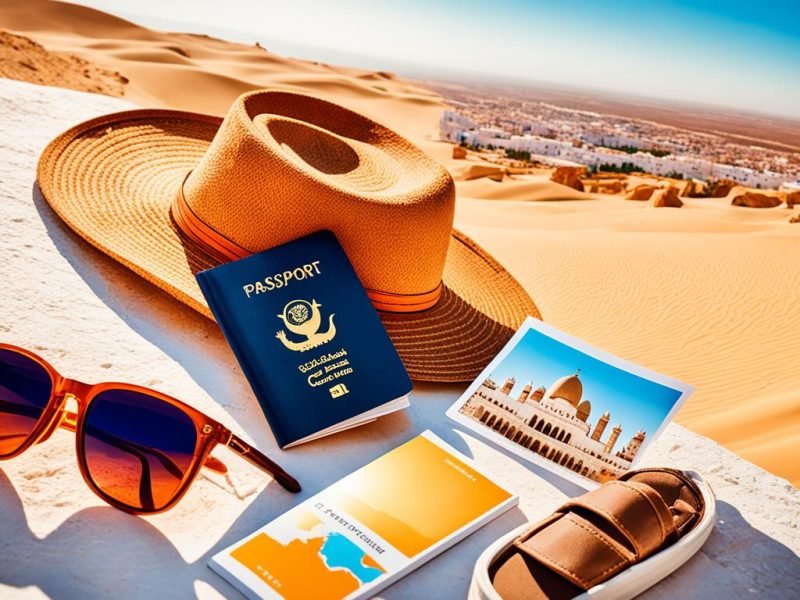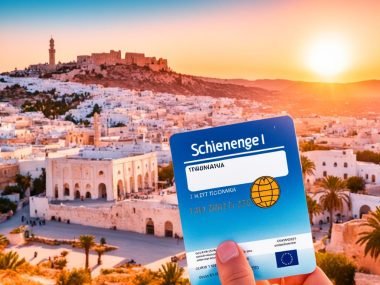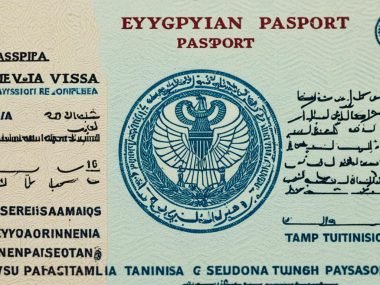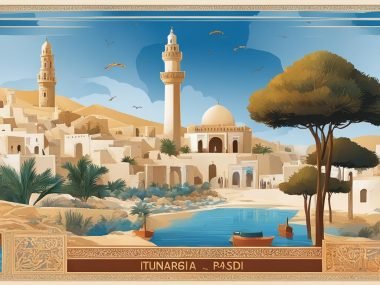In 2019, about 8 million tourists chose Tunisia as their destination. This shows how popular it is becoming. Before you join these travellers, it’s key to know the Tunisia entry requirements.
You need a valid ‘British citizen’ passport to get in. Tunisian rules on this are strict. Not following them might mean you can’t enter. You should talk to the Tunisian Embassy in the UK for advice on your situation. Now, there are no rules for COVID-19 tests or vaccines to enter. But this might change. Make sure your passport is valid for all the time you’re there.
If you’re both British and Tunisian, use the same passport to enter and leave. It’s also smart to check that all your papers are right with your flight or travel company. This stops any issues at the last minute.
Key Takeaways
- Ensure you have a valid ‘British citizen’ passport for your stay.
- Currently, there are no COVID-19 testing or vaccination requirements for Tunisia.
- Contact the Tunisian Embassy in the UK for specific entry requirements.
- Dual nationals should use the same passport for entry and exit.
- Check with travel providers to ensure all documents are up-to-date.
Keep an eye out for more info on passports and travel documents. This will help make your Tunisia trip smooth.
Passport and Travel Documents
When you plan a trip to Tunisia, having all travel documents ready is key. Border officials check carefully. So, being prepared is very important.
Valid Passport
Your passport must be valid for your whole stay in Tunisia. If your passport is out of date or lost, you can’t enter. Keep your travel documents Tunisia up-to-date to avoid problems at the border.
Return or Onward Travel Tickets
Tunisian authorities may ask for proof of your next travel step when you arrive. Keep your travel plans and tickets ready. This shows you have a plan to leave, following travel documents Tunisia rules.
Accommodation Details
You also need to show where you’ll stay, like a hotel booking. Border officials will ask about your stay. Without this information, you might face delays or not get in. It’s crucial to have your accommodation in Tunisia booked ahead.
Visa Requirements for Tunisia
Planning a trip to Tunisia means knowing visa rules. Many visitors don’t need a visa, but it’s good to know the details. This helps avoid any problems.
Visa-Free Travel
Brits get visa-free visits to Tunisia for up to 90 days. This makes travel easy. No need for a Tunisia visa application for short trips. Still, all other visa requirements Tunisia asks for must be met.
Visa Application Process
Staying longer than 90 days? You must check the Tunisian visa process. Contact the Tunisian Embassy in the UK for what you need. A full and correct application avoids delays.
Passport Stamping
Getting your passport stamped in Tunisia is very important. Not doing so can cause problems. If you stay longer than allowed without a visa, you’ll face fines.
Knowing about visa requirements Tunisia makes your trip smooth. You’ll have a great and worry-free time in this beautiful country.
Health and Vaccinations
Planning your trip to Tunisia means thinking about health. It’s key to stay updated with sites like TravelHealthPro. Know what shots you need and the COVID-19 rules to make your trip great.
Recommended Vaccinations
Tunisia asks visitors to get shots to avoid common illnesses. These include:
- Hepatitis A and B
- Typhoid
- Tetanus
- Rabies
Talk to your doctor before you go to Tunisia. They’ll tell you exactly what you need to stay healthy.
COVID-19 Requirements
Right now, Tunisia doesn’t ask for COVID-19 shots or tests to enter. But, staying up-to-date with the latest advice is key. Rules can change, and being ready helps you follow travel rules.
In short, knowing about Tunisia’s health advice is crucial for a safe trip. Always look at reliable medical websites and take all suggested safety steps for a great visit.
Travel Insurance for Tunisia
Going to Tunisia can be exciting. But, it’s very important to have the right travel insurance. Travel insurance Tunisia protects you from sudden medical costs. It also helps if you lose luggage or face cancellations.
Before you go, make sure to look at the FCDO travel insurance advice for Tunisia. This advice from the FCDO matters a lot. If you travel against their advice, your insurance might not work. Always check your insurance fits with their latest guidance.
Your travel insurance Tunisia needs to match your trip plans. It should keep you safe whether you’re seeing Carthage’s old ruins, relaxing in Hammamet, or shopping in Tunis. Your insurance should cover:
- Medical issues, including if you need to be moved for care.
- Cover if your trip is cancelled or interrupted.
- Help if your bags are lost, stolen, or broken.
- Safety for any risky activities you might try.
In short, follow FCDO travel insurance advice and get strong travel insurance Tunisia cover. This will help make sure your trip is safe and fun. Check your policy covers everything you might need.
Currency Exchange Tunisia
Planning a trip to Tunisia? It’s important to know how to handle money there. The Tunisian government has rules about currency. All travellers must follow these rules carefully.
Currency Controls
Tunisia has strict currency rules. If you bring a lot of foreign money, you must declare it. This is to follow the local laws. It makes entering Tunisia smoother for everyone.
Exchanging Tunisian Dinars
You cannot take Tunisian dinars out of the country. Before you leave, exchange any leftover dinars back to pounds or another currency. To do this, show a receipt from when you first got the dinars. ATM receipts won’t work here. The receipt must be from a bank or a recognised exchange place.
Knowing about Tunisia’s money rules helps avoid problems. Make sure you have the right paperwork for exchanging money. This will make your visit smooth and enjoyable.
| Aspect | Details |
|---|---|
| Declaration Threshold | Mandatory for amounts above prescribed limits |
| Exporting Dinars | Not allowed |
| Exchange Receipts | Required for reconverting leftover dinars |
Customs Regulations
It’s very important to follow Tunisia’s customs rules. This makes entering and leaving the country easier. Learn these rules well to avoid trouble at the border.
Prohibited Items
Drones are especially not allowed in Tunisia without permission. If you bring one without asking first, it will be taken away. Always check what you can’t bring before you travel.
Declaring Goods
When you come to Tunisia, you must tell customs about some items. This includes large amounts of money. Not telling them can lead to big fines, so always be honest.
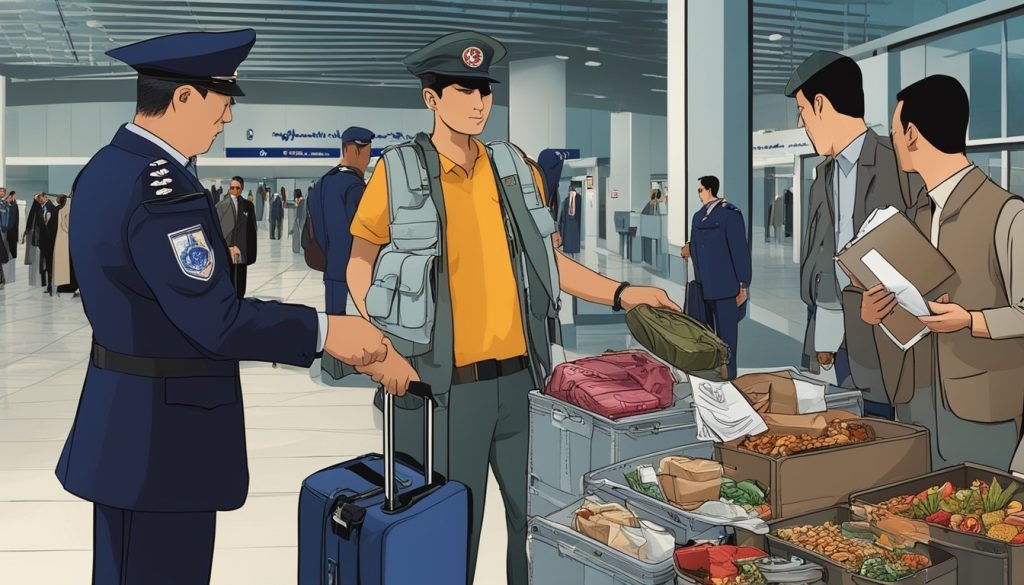
Importing Electronics
Planning to bring electronics? Know that Tunisia has rules about them. Expensive items might need papers to show they are yours. Make sure you know these rules to avoid problems.
Safety and Security in Tunisia
When planning a trip to Tunisia, staying updated is key. Check the FCDO for the latest safety tips. They tell you places to avoid and how to stay safe.
Regions to Avoid
The areas near Algeria and Libya borders are risky. These places face military and terror threats often. It is best to stay away unless you really need to go.
Terrorism Concerns
Tunisia safety is impacted by terrorism. Areas with many tourists need extra caution. Stay alert and keep up with the news for any security updates.
Local Crime Rates
Theft and scams are real risks here. Travellers should look after their stuff well. If something goes wrong, tell the police right away to keep safe.
| Aspect | Details |
|---|---|
| Regions to Avoid | Borders with Algeria and Libya due to military operations and terror threats. |
| Terrorism Concerns | High-alert in public spaces; heightened vigilance advised. |
| Local Crime Rates | Theft and scams are common; report any suspicious activities immediately. |
Essential Travel Tips for Tunisia
Planning a trip to Tunisia? Remember, some tips can make your journey great and safe. Knowing what to do helps make your time enjoyable and safe.
Essential Travel Tips
Going to the desert in Tunisia? Register your trip with the Tunisian National Guard first. This step keeps you safe in emergencies. Don’t go into dangerous places without permission. Safety always comes first. And be careful with GPS directions too.
Using dating apps in Tunisia? Be extra careful. Always tell your loved ones where you are to stay safe. If you get into trouble, contact the local police and your embassy right away. Following this advice makes your visit smooth and worry-free.
Packing List for Tunisia
When planning what to take to Tunisia, think about the weather, local customs, and your activities. Here’s what you should pack:
- Lightweight clothing: Tunisia’s climate is mostly hot and dry. Choose light, airy clothes.
- Sun protection: Don’t forget sunscreen, hats, and sunglasses to shield you from the strong sun.
- Comfortable footwear: Good walking shoes are needed for visiting historic places and markets.
- Respectful attire: Dress modestly, especially at religious places. Cover your shoulders and knees.
- Travel adaptors: You’ll need an adaptor for type C and E sockets for your gadgets.
- Medications: Take your prescribed meds and a simple first aid kit.
Adjust this packing list for Tunisia based on your needs and what you’ll do. Being ready is key, whether you’re heading to the Sahara or Carthage’s old ruins.
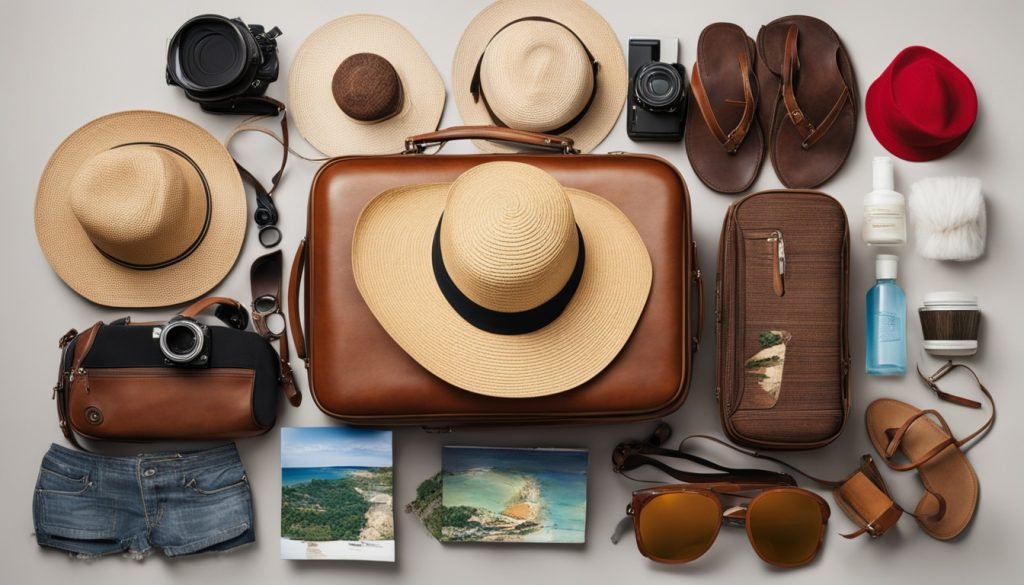
Conclusion
Preparing for a trip to Tunisia needs a lot of planning. It’s key to know the visa needs and health advice. Learning about Tunisia’s culture and money exchange has helped me a lot.
It’s very important to stay safe. I’ve kept up with the latest safety tips. Knowing about travel advice, having my papers ready, and understanding local laws help. This makes my trip to Tunisia safe and fun.
All these details are important for a great trip. Being informed helps me enjoy Tunisia’s culture and sights. I’m ready for an amazing time in this North African country.

